

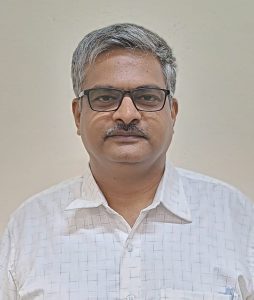
Professor Arun D Mahindrakar's work focuses on applications of control theory to robotics.
His research interests are generated by a keen curiosity to understand and apply systems theory concepts in modelling, analysis and control of wide-variety of dynamical systems arising from robotic systems. He uses tools drawn from mathematical sciences such as differential geometry, non-smooth analysis and convex optimization to analyse and design controllers for dynamical systems. A mix of theory and experimental work gives a completion to his work.
Dr. Arun is a senior IEEE member holds a Bachelor's degree in Electrical Engineering from Karnatak University, Dharwad, Master's from VJTI-Mumbai in Control Systems and Ph.D from Systems & Control Engineering, IITB, Mumbai. He is actively engaged in Indian Control Society, a pan-India society formed to conduct control related activities in India, since its inception.
Website: https://ee.iitm.ac.in/arun_dm/
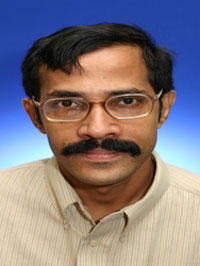
Professor Sridharan's research interests span the following areas: hardware-efficient algorithms for robotics, multi-robot systems and digital design in emerging nanotechnologies.
In the context of hardware-efficient algorithms, Sridharan and his research group have developed CORDIC-based designs and FPGA implementations for mobile robot navigation and mapping. An FPGA-based mobile robot has also been fabricated in-house and extensive experiments have been performed. Recently, a CORDIC-based scheme has been proposed for convolutions in deep networks.
In the domain of multi-robot systems, Sridharan and his research group have investigated rendezvous of mobile robots amidst obstacles and distance constraints using tools from computational geometry. An extension to rendezvous of a pair of robots amidst a powerful adversary has also been studied in a geometric setting.
Work in the area of digital design has focussed on study of (i) majority logic for quantum dot cellular automata (QCA) and (ii) ternary logic for carbon nanotube FETs (CNTFETs). New results on majority logic have been obtained with reference to arithmetic circuit design in QCA. Further, specific unary operators of ternary logic have been studied to obtain high performance SRAM designs in CNTFET technology.
Website: https://ee.iitm.ac.in/sridhara/
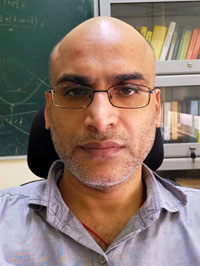
My research interests are broadly in the area of control systems and decision sciences (game theory and optimization), with applications in the analysis of engineering and economic systems.
My current research focuses on theoretical and computational aspects of:
Website: https://ee.iitm.ac.in/vishwa/
Dr. Bharath Bhikkaji works broadly in control engineering with applications of Optimization Theory and Signal Processing.
Specific areas of past work include:
Currently his interests include:
Website: https://ee.iitm.ac.in/~bharath/

Dr. Rachel is an Assistant Professor with the department of Electrical Engineering, IIT Madras. Her research interests are broadly in System theory, Control, Optimization and Energy systems. She currently works on addressing the challenges in controlling complex networked systems such as uncertainties in system parameters and communication network and temporal networks and is interested in optimization problems pertaining to such networks. She also works on distributed optimization developing algorithms for various practical scenarios. She is also working on a few control and optimization problems relevant to LIGO (Laser Interferometric Gravitational wave Observatory).
Website: https://ee.iitm.ac.in/rachel/
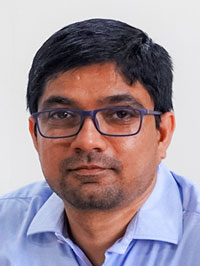
Ramkrishna received PhD from University of Twente in 2006, has held visiting positions at Stanford University School of Medicine. Current research interests include Network Systems and Control with applications to Brain Networks and infrastructure networks, Data driven control and semi-autonomous vehicles. He is also associated with the Robert Bosch Center for Data Science and Artificial Intelligence.
Website: https://ee.iitm.ac.in/ramkrishna/
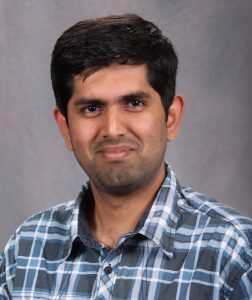
Bharadwaj Satchidanandan is an Assistant Professor of Electrical Engineering at Indian Institute of Technology Madras. Before this, he was a postdoc in the Laboratory of Information and Decision Systems at Massachusetts Institute of Technology, where he was hosted by Prof. Munther Dahleh. He obtained his Ph.D. from Texas A&M University where he was advised by Prof. P. R. Kumar.
His research interests are broad and include Security, Cyber-Physical Systems, Control theory, Mechanism design, Game theory, Renewable energy systems, Millimeter-wave networks, Unmanned Aerial Systems, etc. Please visit his webpage for more details on the work that he has been doing in these areas.
In addition to technical publications, his research has also garnered significant media coverage including in ACM TechNews, TechRepublic, Texas A&M Today, and the top story of 6PM news in KBTX TV. His research won the Best Student Paper Award in the 9th International Conference on Communication Systems and Networks, was finalist for the Best Student Paper Award in the 5th Indian Control Conference, Graduation Day Presentation in the 2018 Information Theory and Applications Workshop, and runner-up in the Hackathon contest held during the 2017 Global Conference on Cyber Space for which an award was conferred by the Prime Minister of India.
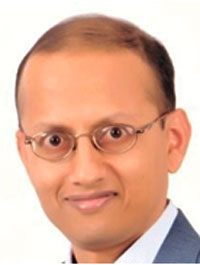
Sanjay P. Bhat received the B.Tech. degree in aerospace engineering from the Indian Institute of Technology, Bombay, in 1992, and the M.S. and Ph.D. degrees in aerospace science from the University of Michigan, Ann Arbor, in 1993 and 1997, respectively. He taught at the Department of Aerospace Engineering, Indian Institute of Technology, Bombay, for ten years before joining TCS Research and Innovation, where he leads a team of researchers working on applying learning techniques to sequential decision-making problems. His research interests include stability theory, nonlinear systems theory, dynamics and control of rotational motion, stochastic processes, and bandit algorithms.
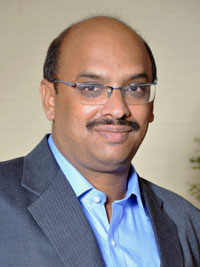
Professor Vijaysekhar Chellaboina is an academic leader and a scientist with extensive experience in teaching and research with expertise in modeling, analysis, and synthesis. He is currently the dean of engineering at GITAM (Deemed to be a University). He is passionate about the modern methods of teaching that are based on interdisciplinary and multidisciplinary principles. Professor Vijay is a strong proponent of student-centric education based on learning outcomes that are appropriate for a fast-changing world.
Professor Vijay received his B. Tech and M.S. in mechanical engineering at the Indian Institute of Technology, Madras (Chennai, India) and the Florida Institute of Technology (Melbourne, FL, USA). He received his Ph.D. from the Georgia Institute of Technology (Atlanta, GA, USA), specializing in the mathematical theory of nonlinear control systems. Professor Vijay's archival contributions include over 200 journals, peer-reviewed conference articles, and five books (published by Springer and Princeton University Press). His book on nonlinear dynamical systems is used as a textbook/reference in advanced courses at top universities worldwide. His research interests are in stability theory and feedback control applications to complex systems, including biomedical and financial systems. His teaching experience includes courses in mechanical and electrical engineering and mathematics.
Before joining GITAM, Professor Vijay was a faculty member at the Universities of Missouri and Tennessee, and Mahindra University. He also served as Dean at Mahindra University and SRM, A.P. University. In addition, he was a principal scientist at TCS Research, heading the risk and finance group.
Professor Vijay is a recipient of US NSF CAREER and TCS Distinguished Researcher awards and is a senior member of IEEE.
More details:
https://www.linkedin.com/in/vchellaboina/
Google Scholar
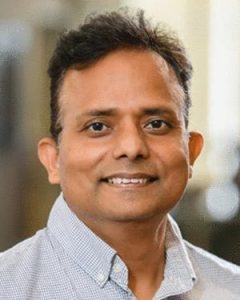
Umesh Vaidya received the Ph.D. degree in mechanical engineering from the University of California at Santa Barbara, Santa Barbara, CA, in 2004. He was a Research Engineer with the United Technologies Research Center (UTRC), East Hartford, CT, USA. He is currently a Professor with the Department of Mechanical Engineering, Clemson University, S.C., USA. Before joining Clemson University in 2019, and since 2006, he was a Faculty with the Department of Electrical and Computer Engineering, Iowa State University.
His current research interests include dynamical systems and control theory. He was the recipient of 2012 National Science Foundation CAREER award.
More details:
https://cecas.clemson.edu/ugvaidya/home/
Google Scholar